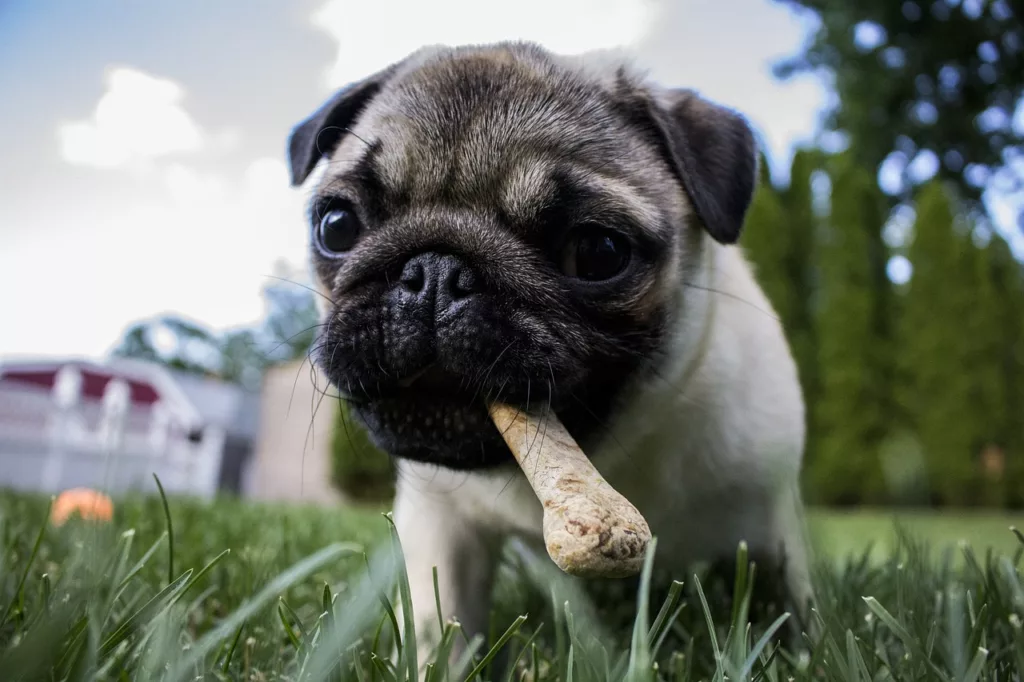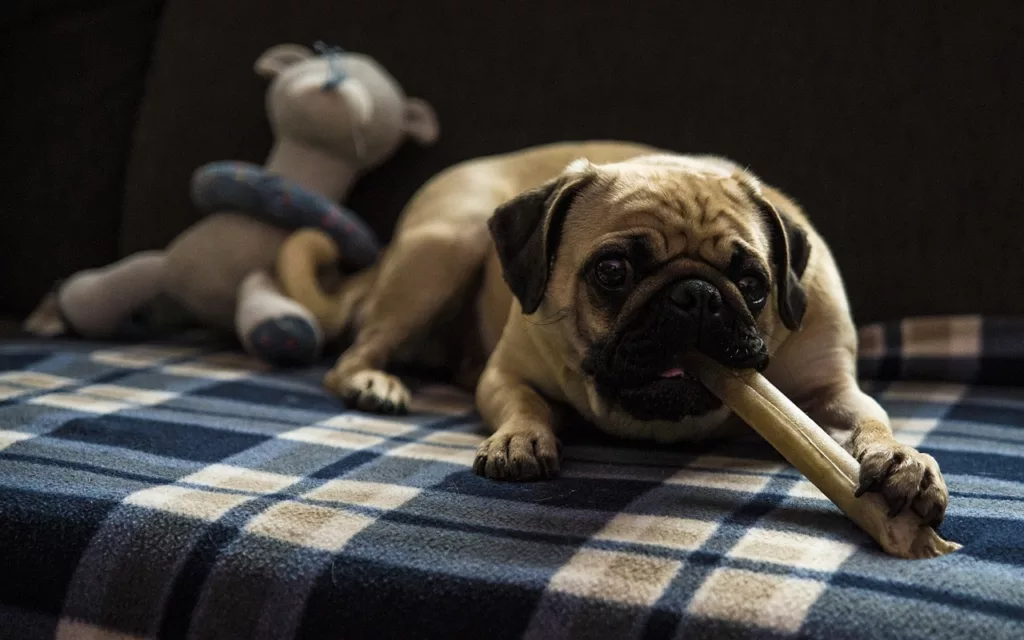Bones are often considered an essential component of a dog’s diet by many individuals. While this is true to some extent, there are several factors to consider, particularly when it comes to young dogs, to avoid jeopardizing their health. The question then arises, can puppies eat bones?
In the subsequent paragraphs, we will clarify whether or not it is safe to provide your puppy with bones and highlight important precautions to keep in mind.
Table of Contents
You might be interested in: Can dogs eat dates? Benefits of dates for dogs

Can puppies eat bones?
During the first six weeks of a puppy’s life, it is generally not recommended to give them any bones. To prevent the risk of ingesting splinters, puppies should only be given raw bones. Moreover, it is important to ensure that the bone is large enough for the puppy not to swallow it. Excessive consumption of bones can also lead to a harmful oversupply of minerals.
Puppies have the instinct to chew, and many dog owners have experienced the challenge of trying to stop a little puppy’s chewing habit. Suitable alternatives such as bones can provide distraction and help to protect clothing and furnishings from the sharp teeth of the little four-legged friend.
When is it appropriate to give bones to puppies?
During the first six weeks of a puppy’s life, it is generally recommended that dog owners avoid giving their puppies bones. This is because the puppy’s stomach is not yet capable of breaking down the calcium found in bones at this stage.
Feeding bones to puppies too early can result in a condition known as “bone droppings.” This can cause blockages in the intestines and may even require surgery followed by hospitalization.
What bones are suitable for puppies?
Similar to adult dogs, puppies should only be given raw bones as cooked bones pose a high risk of splintering when chewed, which can cause dangerous injuries if swallowed.
Additionally, it is crucial to ensure that the bone provided to the puppy is large enough to prevent them from swallowing it whole, as this can result in a life-threatening intestinal obstruction.
Bones from younger animals such as calves are particularly suitable, as they are relatively elastic and less prone to splintering. However, it is recommended to remove any small pieces that may break off the bone before the puppy can swallow them.
Advantages of bones for puppies.
Puppies have been interacting with bones since the beginning of their existence on our planet. They are accustomed to biting and playing with them, and bones can aid in improving their teeth. For instance, bones play a crucial role in strengthening the jaw and maintaining healthy gums.
The latter is especially important, as veterinary expenses for middle-aged dogs can add up quickly if dental health has not been prioritized since puppyhood. My veterinarian informed me that yearly dental cleaning for my 8-year-old dog could have been avoided had he been given puppy bones. On the other hand, my 1-year-old dog has been consuming puppy bones since she was a puppy, and her gums are currently in excellent condition.
However, the benefits of puppy bones are not limited to dental health alone. Below are several additional positive points:
- . Puppy bones offer a range of benefits, including reducing or preventing stress in restless puppies, complementing a dog’s diet, and preventing obesity by satisfying hunger without adding unnecessary calories.
- They can also serve as 100% natural toys for your furry friend to enjoy.
- Additionally, puppy bones can aid in preventing the formation of tartar on the teeth and gums by promoting the natural production of saliva, which cleanses the mouth.
- They also promote the growth of permanent teeth in your puppy, while providing essential minerals such as magnesium, calcium, or phosphorus.
Moreover, puppy bones can be particularly helpful when you have to leave your dog home alone for several hours, which can prevent them from destructive behaviors such as chewing on furniture. This makes them a great addition to any tips for leaving your dog home alone. I wish someone had given me this advice before my dog destroyed my couch at home, as it could have saved me a considerable amount of money on furniture!
Risks of bones for puppies
While the desire to give a puppy a bone to chew on is understandable, it’s important to note that the consumption of bones is associated with certain risks, especially for young dogs. One such risk is an oversupply of minerals, such as calcium, which can be harmful to the dog’s health. Additionally, eating too much bone can lead to digestive problems, such as constipation.

Moreover, giving a puppy bones to chew on can also cause tooth fractures and injuries in the mouth, which can be painful and require veterinary attention. Therefore, dog owners need to be aware of these potential risks and take precautions to ensure their puppy’s safety and well-being.
Read also: Puppy shots . Are they mandatory, when to get them?
You should be careful when giving puppies Bones.
Puppies, just like adult dogs, have an innate desire to chew on objects. Unfortunately, this can lead to the destruction of prized possessions, hence the saying “better safe than sorry.” It’s crucial to protect any belongings that you cherish from your curious four-legged friend until they learn that not everything is meant for them. Naturally, you want to provide alternatives for your new companion, and one option is bones.
However, not all bones are suitable for puppies, and the consequences of feeding them the wrong type of bone can be severe. Therefore, it’s essential to gradually introduce your puppy to bones and monitor their reaction. Puppies have yet to develop the digestive capabilities necessary to process bones properly. Dogs require a sufficient amount of stomach acid and digestive juices to break down bone calcium. Without this process, “bone droppings” can occur, causing significant pain and, in severe cases, the need for surgery.
It’s critical to offer your puppy only raw boiled food. You can begin offering your puppy raw bones as early as six weeks of age, but the bone should be large enough that it cannot swallow it. A bigger bone will also keep them occupied for an extended period. However, be cautious and watch your puppy while they are chewing. If they break off small pieces, it’s crucial to remove them and the broken bone.
Another alternative is ground-up raw bones. But it would help if you ground them finely to minimize the risk of injury to your puppy. Raw chicken necks and wings are popular choices for puppies since the vertebrae do not splinter, and they are easy to chew.

It’s important to note that you shouldn’t give your puppy bones a high meat content until their teeth are fully developed. Lastly, homemade dog toys are an excellent alternative to bones that can keep your puppy occupied without posing any risks.
Can puppies eat bones? Our conclusion
Yes, It is perfectly safe to give your puppy a raw bone to chew on as a treat from time to time. However, it is crucial not to replace a complete meal with bones.
To ensure that your puppy receives all the necessary nutrients, it is recommended to feed them high-quality puppy food. This type of food is formulated specifically to meet your puppy’s nutritional requirements, which is the most effective way to promote their healthy development.
Sources: Bones for puppies , PetMd Nutriotion, AKC